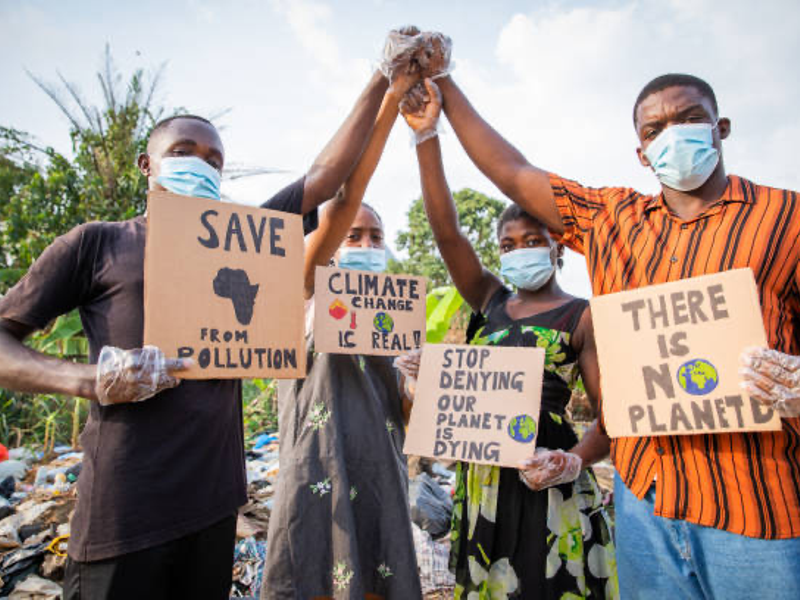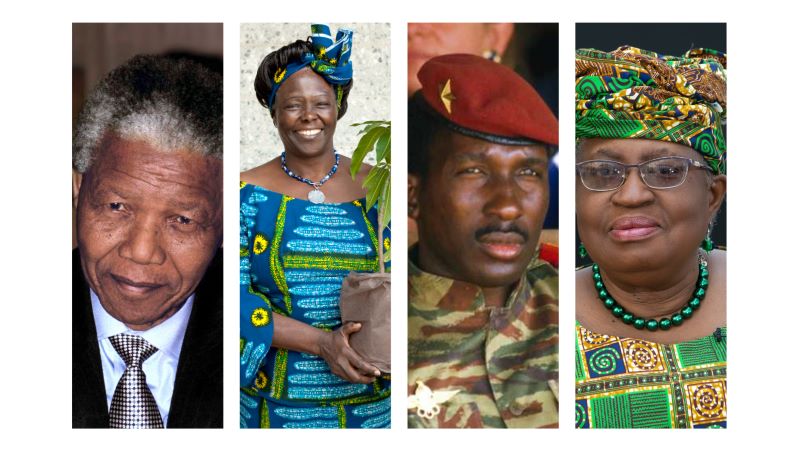Source: iStockphoto
Climate change is one of the most critical issues facing our planet today. Its effects are being felt worldwide, with rising global temperatures leading to a cascade of environmental disruptions. These disruptions include extreme weather events, rising sea levels, melting glaciers, and disruptions to plant and animal life.
Climate change poses a rising threat to Africa, one of the most sensitive continents to its consequences. Some reports say Africa is “the most vulnerable continent on Earth.” Climate change and variability are anticipated to impair agricultural productivity, food security, and water security. As a result, there will be adverse effects on people’s livelihoods and sustainable development in Africa. Despite contributing solely two to three percent of global emissions, Africa bears the brunt of climate change’s impacts. This vulnerability stems from the continent’s ongoing socioeconomic challenges. Climate change is a worldwide threat, but its consequences disproportionately burden those with fewer resources. A lack of financial means limits Africa’s ability to adjust to and recuperate from extreme weather events.
A recent study by the World Weather Attribution group (March 22nd, 2024) revealed that human-caused climate change significantly amplified the severity of the February heatwave in southern West Africa. The analysis suggests the heatwave would have been impossible without climate change. Researchers found the heat index, which combines temperature and humidity to reflect how hot humans feel, was approximately four °C higher due to climate change.
The impact of climate change in Africa is far-reaching and threatens to undermine decades of hard-won development progress. The continent faces a future with more frequent and severe droughts, floods, and heatwaves. These extreme weather events can devastate agricultural production, disrupt water supplies, and displace communities. Climate change also threatens food security, public health, and economic stability.
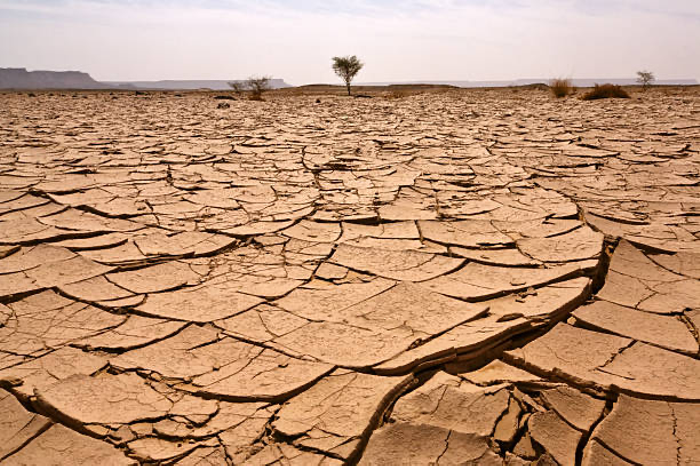
Source: iStockphoto
Climate change is wreaking havoc on Africa’s diverse ecosystems and weather patterns, with many concerning effects. Here’s a closer look at some of the critical impacts:
A. Rising Temperatures:
- Uneven Heating: Africa has witnessed an undeniable rise in average temperatures across the continent. However, some regions are experiencing this warming at an alarming rate. The Sahel region, for example, is heating up at nearly twice the global average, leading to rapid desertification.
- Heatwaves and Hot Days: The increased average temperatures translate into a rise in the frequency and intensity of heatwaves. These scorching periods can last for days or weeks, pushing temperatures far beyond tolerable for humans, livestock, and crops. The frequency of sweltering days also increases, leading to heat stress and potential heatstroke in vulnerable populations.
B. Changing Rainfall Patterns:
- Drought Concerns: Climate change is disrupting historical rainfall patterns across Africa. Some regions, particularly in North Africa and South Africa, are experiencing decreased precipitation. This decline in rainfall translates into prolonged droughts, leading to water scarcity, crop failure, and food insecurity.
- Unpredictable Downpours: While some regions face drought, others are experiencing a shift towards more intense and unpredictable rainfall events. These erratic downpours can cause flash floods, overwhelm drainage systems, and damage infrastructure and property. The unpredictable nature of these storms also makes it difficult for farmers to plan their planting and harvesting cycles.
C. Sea Level Rise:
- Coastal Threat: As global temperatures rise, so do sea levels due to the thermal expansion of oceans and melting glaciers. This poses a significant threat to Africa’s extensive coastlines, where millions live and work. Low-lying coastal areas are particularly vulnerable to inundation, saltwater intrusion into freshwater sources, and erosion.
- Erosion and Displacement: Rising sea levels increase coastal erosion, threatening infrastructure, homes, and agricultural land. Coastal communities face the risk of displacement as their land becomes increasingly vulnerable to flooding and erosion. This disrupts lives and livelihoods and puts pressure on inland resources as displaced populations seek new homes.
Consequences of Climate Change: A Looming Crisis for Africa
The disruptions caused by climate change in Africa have far-reaching consequences, jeopardizing the continent’s most fundamental needs and creating a precarious future. Here’s a deeper look at how climate change is threatening Africa’s food security, water security, and stability:
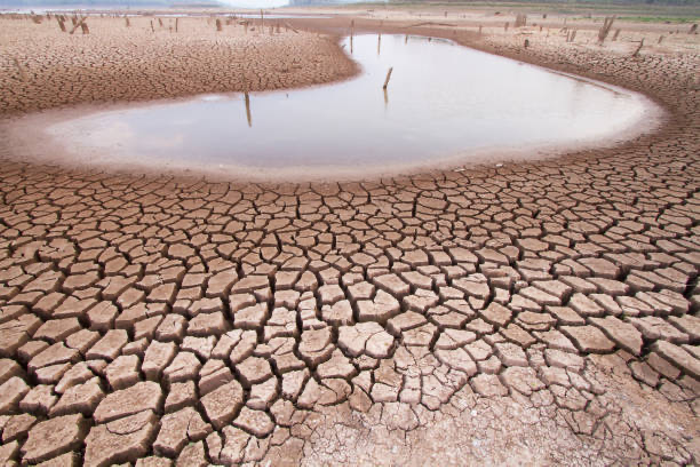
Source: iStockphoto
- Africa’s reliance on rain-fed agriculture makes it ground zero for climate change’s impact. Droughts cause crop failure, threatening food security. Unpredictable rainfall harms crops too, with floods washing them away and disrupting planting cycles. This decline in yields, coupled with population growth, creates malnutrition, especially among children.
- Decreased precipitation and rising temperatures worsen water scarcity. Lakes, rivers, and groundwater shrink, putting pressure on existing resources and traditional practices. Competition for this limited water intensifies between communities, farms, and industries, potentially leading to social unrest.
- Limited access to clean water due to scarcity increases the risk of waterborne diseases and makes sanitation difficult. Extreme weather events displace people, destroying homes and livelihoods. This mass displacement creates a humanitarian crisis and strains resources.
- Climate change can also fuel conflict, as competition for dwindling resources like water, land, and grazing areas creates friction that can escalate into violence. Displaced people often migrate to cities or across borders, but informal movement makes them vulnerable to exploitation.
Adaptation and Mitigation Strategies: A Path Forward for Africa
Climate change presents a monumental challenge for Africa, but it is not insurmountable. By adopting a two-pronged approach of adaptation and mitigation, African nations can build resilience and navigate the changing climate.
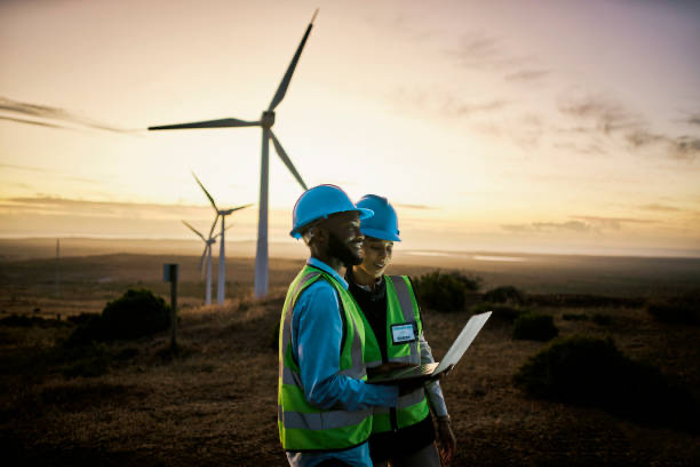
Source: iStockphoto
A. International Cooperation, A Shared Responsibility: The world must work together to fight climate change. Big polluters need to cut emissions by switching to clean energy and sustainable practices. Africa, hit hard by climate change, needs financial help from developed nations. This aid can fund climate-resilient infrastructure, drought-resistant crops, and renewable energy.
B. Building Resilience, Preparing for the Future: Climate-smart farming with drought-resistant crops and better water management is key to food security. Early warning systems for extreme weather can save lives by giving communities time to prepare. Supporting local efforts that build on traditional knowledge strengthens long-term resilience.
C. Shifting to Renewable Energy Sources: Africa’s abundant sunshine, wind, and geothermal power can be harnessed for clean energy. Investing in renewable energy reduces reliance on fossil fuels, cuts emissions, and improves air quality. Technological innovation can make clean energy cheaper and more accessible, creating green jobs and boosting the economy.
Conclusion: It’s Time for Action in Africa
Let’s face it: climate change isn’t some future threat looming for Africa – it’s happening right now. We’re seeing the effects of rising temperatures, unpredictable weather patterns, and extreme weather events. These aren’t just statistics – they’re disrupting lives and livelihoods across the continent.
The good news? Africa isn’t sitting on its hands. Farmers are experimenting with drought-resistant crops, communities are setting up early warning systems for floods, and there’s a growing push for renewable energy solutions. Africa is a continent brimming with innovation and resilience.
But here’s the thing: Africa can’t do this alone. Climate change is a global problem, and it requires a global solution. Developed nations need to step up and slash their greenhouse gas emissions – they’re the ones who put most of that carbon in the atmosphere in the first place. And let’s not forget financial aid. Africa needs resources to adapt to the changing climate and build a more sustainable future.
Think about it this way: by helping Africa adapt to climate change, we’re not just doing something good for the continent but investing in a more stable and prosperous world for everyone. A thriving Africa with a booming clean energy sector benefits everyone.
So, what’s the takeaway? Climate change in Africa is a serious challenge but not impossible. With a collective global effort, Africa can adapt, innovate, and build a brighter future for its people and the planet. Let’s work together to make that future a reality.

Anand Subramanian is a freelance photographer and content writer based out of Tamil Nadu, India. Having a background in Engineering always made him curious about life on the other side of the spectrum. He leapt forward towards the Photography life and never looked back. Specializing in Documentary and Portrait photography gave him an up-close and personal view into the complexities of human beings and those experiences helped him branch out from visual to words. Today he is mentoring passionate photographers and writing about the different dimensions of the art world.

